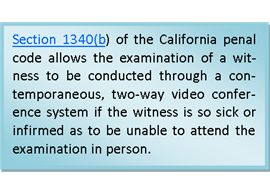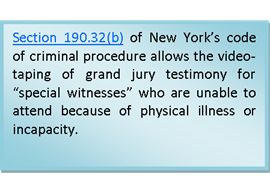Although people age at different rates and in different ways, adults over the age of 65 may have some level of physical or mental impairment (see Demographics of the Aging Population). For example, a 2009 study of cognitive functioning in people age 70-79 over eight years found that 30 percent maintained cognitive functioning, but 53 percent experienced some loss of function and 16 percent had major cognitive decline. Physical and mental impairments can impact an older person's ability to take part fully in court proceedings.
Accommodations in the Courtroom and Judicial Process
Courts can help ensure full access and participation by older persons with a physical or mental limitation by making accommodations to the courtroom setting, the handling of court hearings, and case and calendar management. The American Bar Association "Recommended Guidelines for State Courts Handling Cases Involving Elder Abuse" recommend that courts "provide accommodations for persons with physical and mental deficiencies and, if necessary, hold hearings in cases involving elder abuse in the setting that best accommodates the needs of the abused older person." The Eleazer Courtroom at Stetson University is a state-of-art facility that demonstrates how courtrooms can be modified to afford older people an appropriate legal forum.
The following examples of accommodations for older persons with physical or mental impairments have been implemented or recommended by judges, court managers and other professionals working to improve their courts' responses to elder abuse:

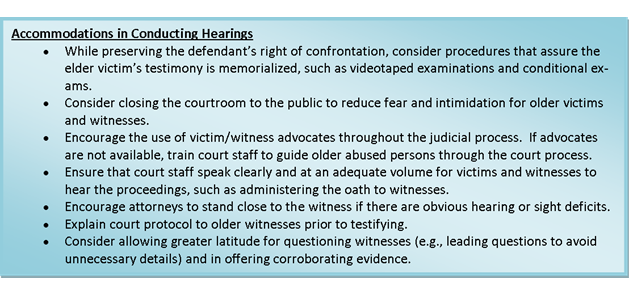
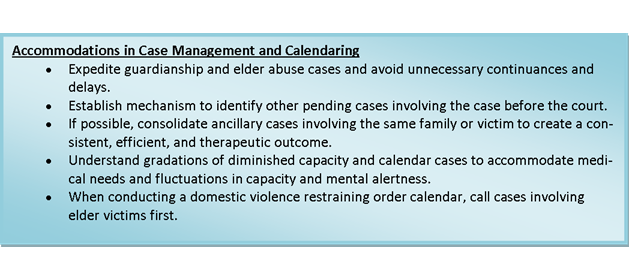
Courthouse Facilities and Role of Technology
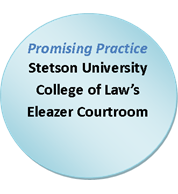 Physical access to courthouses and the justice process are real concerns for older persons. Although each individual ages at a different rate, in 2005, 42% of adults over 65 reported some form of functional limitation. Common signs of advanced aging include dimming eyesight, failing hearing, loss of memory, decreased comprehension rate, and physical impairment. These impairments can decrease elderly persons' abilities to perform daily tasks, decrease mobility, and can affect elders' communication with others.
Physical access to courthouses and the justice process are real concerns for older persons. Although each individual ages at a different rate, in 2005, 42% of adults over 65 reported some form of functional limitation. Common signs of advanced aging include dimming eyesight, failing hearing, loss of memory, decreased comprehension rate, and physical impairment. These impairments can decrease elderly persons' abilities to perform daily tasks, decrease mobility, and can affect elders' communication with others.
Promising Practices and Programs
Promising practices combine physical accommodations and technology, with the goal of ensuring physical access to the courthouse or participation via technology.
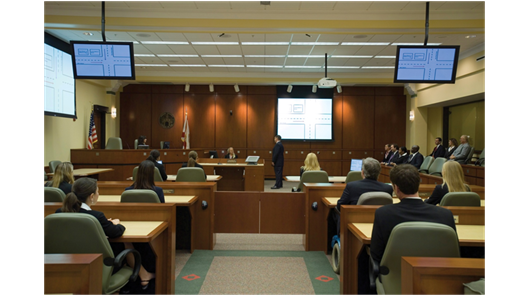
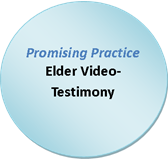 Videotaped testimony is generally used when a witness is found to be either physically or emotionally unable to testify in person. Older individuals, due to severe illness, physical impairment, and other disabilities associated with aging, are unable to be present at court proceedings. These circumstances make the use of videotaped testimony beneficial in elder cases.
Videotaped testimony is generally used when a witness is found to be either physically or emotionally unable to testify in person. Older individuals, due to severe illness, physical impairment, and other disabilities associated with aging, are unable to be present at court proceedings. These circumstances make the use of videotaped testimony beneficial in elder cases.
Criminal code provisions in California and New York provide models for other states considering the use of video testimony in cases involving older litigants, victims, and witnesses. The California law authorizes the conditional examination of a witness in a criminal case who may be unavailable at trial. The New York statute bill acknowledges that elderly victims are often "unable to pursue restitution from the perpetrators" as a result of "advanced age and the length of court proceedings."
Language Services
Limited English proficiency can be another impediment to access to justice for older adults. Full and meaningful participation in court proceedings can be difficult for any person with limited English proficiency, and these difficulties are exacerbated for older adults who also may be experiencing declining physical or mental capabilities. Courts should be aware of the potential need for language services for older persons, including court interpretation, document translation, and availability of written materials in languages other than English. Numerous resources are available to assist courts in assessing the need for language services and for providing access to those services. See the Language Access Resource Guide, available from the National Center for State Courts, for a compilation of resources. Among these resources is a benchcard that provides information related to the appointment and qualification of court interpreters in domestic violence protection order cases.
Resources
Courts have extensive experience in applying problem-solving principles in cases that can involve multiple and interrelated issues (e.g., drug courts, mental health courts, domestic violence courts and family courts). Problem-solving principles are similarly appropriate for addressing the complexities of cases involving older persons and the challenges associated with providing effective remedies and resolutions in a timely manner. The National Center for State Courts offers a Problem-Solving Toolkit that outlines problem-solving court approaches and the steps necessary to successfully develop such a program. Rothman and Dunlop review the experiences of several jurisdictions in engaging in multi-agency collaboration in Judicial Responses to an Aging America (Court Review). The key to developing elder-friendly programs is the use of specialized staff and/or case managers to create linkages between clients, courts, and local service providers. See Interagency Coordination in the Elder Abuse section and Court Guide to Effective Collaboration on Elder Abuse under Toolkits.
Several courts, in partnership with local agencies and governments, have created innovative programs to provide assistance for older persons. Examples of innovative strategies include Elder Justice Centers (EJCs) and Elder Protection Courts. The general mission of these programs is to remove barriers to the court system and to enhance linkages between elders, courts, and service providers. Variations of these models can be incorporated into existing court programs and can be adapted to meet the needs of the local community.
Elder Justice Centers
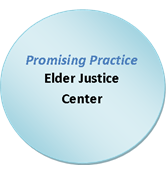
13th Circuit Court's Elder Justice Center
In Tampa, Florida, the Florida State Courts System and Hillsborough County collaborate to fund the Elder Justice Center, which serves persons over the age of 60. The EJC provides five primary functions:
- A designated facility to respond to the needs of the seniors in the community, including information and referrals. The facility's services can include assisting with communication devices, providing a library of brochures on available services in the surrounding community, and providing wheelchairs for use as the courthouse.
- Public education to the elderly and those who work with them. Topics can include telemarketing and consumer fraud, elder abuse, identity theft, family guardianship, and professional guardian continuing education.
- Coordination with existing agencies, such as legal services, law enforcement, and long term care facilities, that presently provide services to seniors and provide case management services as needed.
- Case management services to victims of abuse, neglect, or exploitation, including victim advocacy in criminal cases, victim services for domestic violence injunctions, and case coordination when an elder is involved in multiple cases or divisions.
- Case management and monitoring services, including the review of all initial guardianship reports, the review of all annual guardianship reports, the review of guardian fee petitions, and court monitoring services in guardianship cases for wards of the court.
Elder Protection Courts
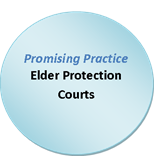
The concept of the Elder Protection Court originated with the Superior Court of California, Alameda County. The program was guided by an Elder Access Committee that included judicial officers, other court divisions, agency partners, and the legal community. The project offered the following services and resources:
- Collaboration with system partners to provide legal and social services related to elder abuse.
- Development of procedures to identify, track, investigate, manage, and refer cases involving elder abuse, and the use of a case manager.
- Improvement in access to the court and court filing procedures for older adults involved in elder abuse cases.
- Creation of a service referral system through the case manager.
The principles and practices developed in Alameda County are now being applied in other California Superior Courts, such as Ventura County.
The Ventura elder abuse court hears only criminal cases designated by California Penal Code 368, which offers "special consideration and protection" for elders and dependent adults. The District Attorney's Office identifies eligible cases, which are heard by a designated judge in a courtroom that has a separate observation room for vulnerable witnesses and victims. Collaboration between courts, prosecutors, public defenders, legal aid, and local service providers makes it possible for the court to identify and focus on "368" cases.

